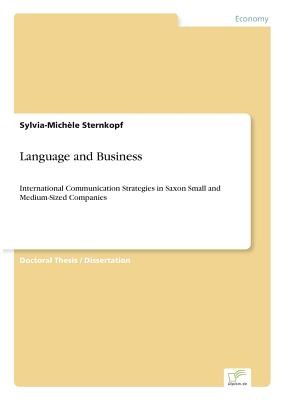
- We will send in 10–14 business days.
- Author: Sylvia-Michèle Sternkopf
- Publisher: Diplom.de
- Year: 2004
- Pages: 388
- ISBN-10: 3838681614
- ISBN-13: 9783838681610
- Format: 14.8 x 21 x 2.2 cm, minkšti viršeliai
- Language: English
- SAVE -10% with code: EXTRA
Reviews
Description
Inhaltsangabe: Abstract: Small and medium-sized enterprises (SMEs) are the backbone of the German economy. Against the background of continuing globalisation, they are increasingly faced with the challenge of internationalisation. This study was designed as an empirical investigation of how well SMEs in the federal state of Saxony are prepared for this task of the future, which measures they take in order to market their products and services in the global marketplace, and it tries to identify their strengths and weaknesses in this respect. The very nature of this thesis is thus a truly interdisciplinary approach, investigating marketing aspects as well as linguistic factors. The main focus was on the language small and medium-sized companies use for their international communications. English has long become the lingua franca of the globalising economy, and this study set out to investigate how well SMEs are prepared to meet the linguistic requirements imposed on them by global business. Enterprises in the new German states are widely believed to be disadvantaged with regard to their communicative competence in English, since English played only a minor role for decades, but has risen to decisive significance within the past couple of years, taking many companies and their employees by surprise, finding them not as well prepared as their colleagues in the old German states. Still, finding their way to the new export markets in Western Europe, the Americas and Asia are vital for the survival of Saxon economy, and communicative competence in English as the lingua franca of international business is the major prerequisite for achieving this objective. Corporate communicative competence involves various aspects, including the foreign language skills of the employees - covering the entire range of linguistic skills from oral communication including listening and speaking, giving presentations or participating in negotiations to writing skills ranging from reading and
EXTRA 10 % discount with code: EXTRA
The promotion ends in 21d.02:25:24
The discount code is valid when purchasing from 10 €. Discounts do not stack.
- Author: Sylvia-Michèle Sternkopf
- Publisher: Diplom.de
- Year: 2004
- Pages: 388
- ISBN-10: 3838681614
- ISBN-13: 9783838681610
- Format: 14.8 x 21 x 2.2 cm, minkšti viršeliai
- Language: English English
Inhaltsangabe: Abstract: Small and medium-sized enterprises (SMEs) are the backbone of the German economy. Against the background of continuing globalisation, they are increasingly faced with the challenge of internationalisation. This study was designed as an empirical investigation of how well SMEs in the federal state of Saxony are prepared for this task of the future, which measures they take in order to market their products and services in the global marketplace, and it tries to identify their strengths and weaknesses in this respect. The very nature of this thesis is thus a truly interdisciplinary approach, investigating marketing aspects as well as linguistic factors. The main focus was on the language small and medium-sized companies use for their international communications. English has long become the lingua franca of the globalising economy, and this study set out to investigate how well SMEs are prepared to meet the linguistic requirements imposed on them by global business. Enterprises in the new German states are widely believed to be disadvantaged with regard to their communicative competence in English, since English played only a minor role for decades, but has risen to decisive significance within the past couple of years, taking many companies and their employees by surprise, finding them not as well prepared as their colleagues in the old German states. Still, finding their way to the new export markets in Western Europe, the Americas and Asia are vital for the survival of Saxon economy, and communicative competence in English as the lingua franca of international business is the major prerequisite for achieving this objective. Corporate communicative competence involves various aspects, including the foreign language skills of the employees - covering the entire range of linguistic skills from oral communication including listening and speaking, giving presentations or participating in negotiations to writing skills ranging from reading and


Reviews